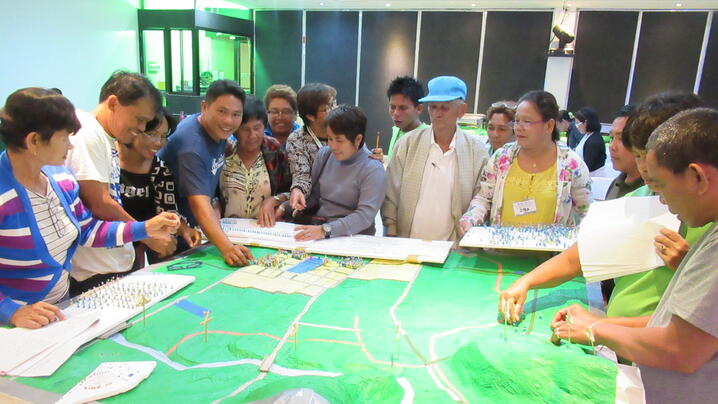
By Jay Gonzalez is Mayor George Christopher Professor of Public Administration at Golden Gate University
Drawing from the rich and colorful Philippine experiences featured in our upcoming Climate Change and Disaster Resilience book, our ICMA UNITE panel shared practical knowledge and activities crafted by residents and city hall leaders to mitigate and manage the El Niño and La Niña effects and the devastation they cause on people’s lives and livelihoods. El Niño causes the abnormal warming of the bodies of water surrounding and crisscrossing the country’s 7,107 islands, while La Niña is the out-of-season cooling of the seas, oceans, rivers, and lakes. As a result, warmer waters disrupt air and sea currents affecting migration patterns and mating seasons. Hotter water kills coral reefs disrupting the ecosystem’s cycle of life. The extraordinary increases in evaporation increases rain volume and increases the spinning velocity of winds resulting in more powerful hurricanes or typhoons.
The distressing reminders of climate change are very much etched in every Filipino’s mind, especially when the big ones hit. Like in 2013 when Super Typhoon Yolanda devastated several Philippine cities with very strong 196 mph winds causing close to $3 billion in damage and more than 6,000 deaths. In some coastal cities, the unsustainable harvesting of mangrove forests, which act as natural defenses, made the onslaught more lethal. More Yolanda-grade typhoons mean more toxic red tides causing wildlife mortalities and harmful human exposure. How do Filipinos address this new normal? What are lessons for America’s cities?
Through ICMA, the United States continues to help its long-time ally with sustainable climate solutions. This was underscored by Disaster Resilience Specialist Jake Cadag in discussing how ICMA’s USAID Strengthening Urban Resilience for Growth with Equity (SURGE) team gathered citizens and city officials in participatory risk reduction, climate adaptation, and development planning workshops. At highly urbanized General Santos City, SURGE provided multi-stakeholder training on GIS mapping and database management producing essential maps for land use planning and hazard and risk assessment (i.e., flood map, landslide map, storm surge map, etc.). While in Legazpi City, a coastal municipality located near a volcano, SURGE supported the development of the city’s first participatory 3-dimensional map and contingency plan to help mitigate vulnerabilities to volcanic eruptions, typhoons, earthquakes, and tsunamis.
Doubling down on the importance of citizen engagement in any intervention was the lesson shared by the University of the Philippines – National College of Public Administration and Governance Professor Fe Mendoza. Focusing on lessons from mangrove, reef, and species preservation at the award-winning waterside municipalities of Bindoy, Del Carmen, and Iloilo, she elaborated on such success factors as:
- Implementing a social marketing campaign.
- Working with common goals in mind.
- Connecting ecosystem management, i.e., upland resource management, and coastal resource and development.
- Using simple innovative local technology.
- Institutionalizing sustainability through ordinances that highlight stakeholder roles and responsibilities.
- Stricter enforcement of laws.
Building on the comments of Professor Mendoza, ICMA University of the Philippines Student Chapter Co-President and practicing attorney Alder Delloro delved into the rarely talked about intersection of climate justice and environmental litigation. He highlighted the game-changer in the Philippine jurisdiction that pertains to the Rules of Procedures for Environmental Cases promulgated by the Philippine Supreme Court in the exercise of its auxiliary power to enforce constitutional rights. The rules provide the following legal actions to solidify citizen driven environmental protection:
- Citizen Suits – giving the right to ordinary citizens to initiate legal action to enforce their environmental rights.
- Consent Decrees.
- Temporary Environmental Protection Orders in cases of threat of serious damage to the environment (or life sources).
- Writ of Kalikasan or the writ of nature.
- Writ of Continuing Mandamus.
- Protection against harassment countersuits.
- Adoption of the Precautionary Principle.
Finally, Filipino American Gabby Moraleda built on Attorney Delloro’s argument by making the case for low-income, high-risk families (marginal farm workers and fishermen) whose lives and livelihoods are most severely affected by climate change and natural disasters. Moraleda urged the global Philippine diaspora to help their devastated hometowns build back better to offset El Niño and La Niña disasters through resilient transition shelters using locally available materials, from reusable shipping container vans to the ever-present strong but flexible bamboo.
Check out the UNITE session on demand . Registration for UNITE: A Digital event is still open. All sessions will be available on-demand through December 31, 2020. If you are not registered for UNITE, register today and you will get access to the 200+ on-demand sessions showcased during September 23-26 PLUS continue the conversation with your local government peers on Friday, November 13 where new sessions will be provided.
*Long-time ICMA member Jay Gonzalez is Mayor George Christopher Professor of Public Administration at Golden Gate University (GGU). He and ICMA Life member Roger Kemp and GGU Distinguished Adjunct Professor Alan Roper are the co-editors of Climate Change and Disaster Resilience: Challenges, Actions and Innovations in Urban Planning.
New, Reduced Membership Dues
A new, reduced dues rate is available for CAOs/ACAOs, along with additional discounts for those in smaller communities, has been implemented. Learn more and be sure to join or renew today!

